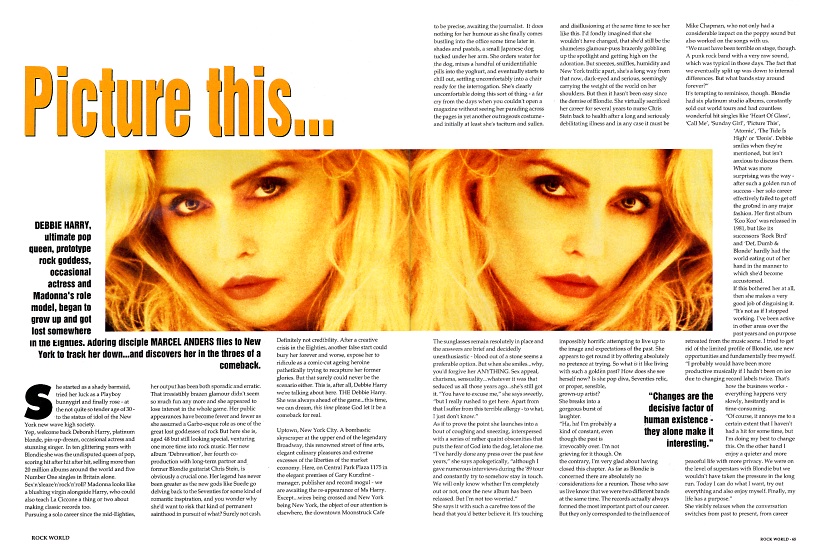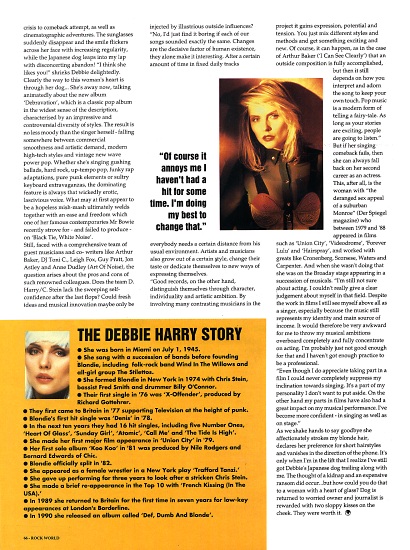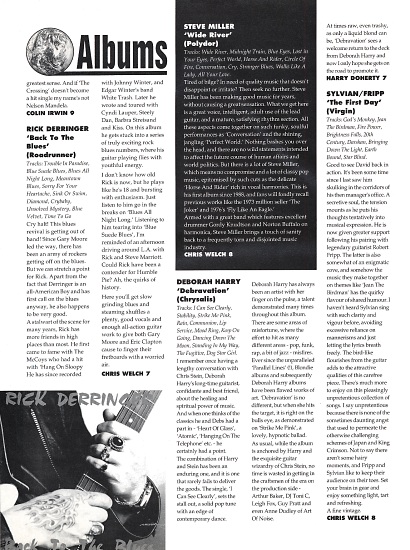ROCK WORLD
 July 1993
July 1993
Pages 3, 64, 65, 66, 72
DEB’S DELIGHT
This month sees the return of one of rock’s greatest legends. We track down Debbie – sorry, Deborah – Harry in New York for an exclusive interview as she prepares for the release of a brand new album ‘Debravation’, which recalls the hazy, crazy days of Blondie while taking her firmly into the Nineties. She may also be touring soon so WATCH THIS SPACE!
Picture this…
DEBBIE HARRY, ultimate pop queen, prototype rock goddess, occasional actress and Madonna’s role model, began to grow up and got lost somewhere in the Eighties. Adoring disciple MARCEL ANDERS flies to NEW YORK to track her down… and discovers her in the throes of a comeback.
She started as a shady barmaid, tried her luck as a Playboy bunnygirl and finally rose – at the not quite so tender age of 30 – to the status of idol of the New York new wave high society.
 Yep, welcome back Deborah Harry, platinum blonde, pin-up-dream, occasional actress and stunning singer. In ten glittering years with Blondie she was the undisputed queen of pop, scoring hit after hit, selling more than 20 million albums around the world and five Number One singles in Britain alone.
Yep, welcome back Deborah Harry, platinum blonde, pin-up-dream, occasional actress and stunning singer. In ten glittering years with Blondie she was the undisputed queen of pop, scoring hit after hit, selling more than 20 million albums around the world and five Number One singles in Britain alone.
Sex’n’sleaze’n’rock’n’roll? Madonna looks like a blushing virgin alongside Harry, who could also teach La Ciccone a thing or two about making classic records too.
Pursuing a solo career since the mid-Eighties, her output has been both sporadic and erratic. That irresistibly brazen glamour didn’t seem so much fun any more and she appeared to lose interest in the whole game. Her public appearances have become fewer and fewer as she assumed a Garbo-esque role as one of the great lost goddesses of rock But here she is, aged 48 but still looking special, venturing one more time into rock music. Her new album ‘Debravation’, her fourth co-production with long-term partner and former Blondie guitarist Chris Stein, is obviously a crucial one. Her legend has never been greater as the new gods like Suede go delving back to the Seventies for some kind of romantic inspiration, and you wonder why she’d want to risk that kind of permanent sainthood in pursuit of what? Surely not cash. Definitely not credibility. After a creative crisis in the Eighties, another false start could bury her forever and worse, expose her to ridicule as a comic-cut ageing  heroine pathetically trying to recapture her former glories. But that surely could never be the scenario either. This is, after all, Debbie Harry we’re talking about here. THE Debbie Harry. She was always ahead of the game… this time, we can dream, this time please God let it be a comeback for real.
heroine pathetically trying to recapture her former glories. But that surely could never be the scenario either. This is, after all, Debbie Harry we’re talking about here. THE Debbie Harry. She was always ahead of the game… this time, we can dream, this time please God let it be a comeback for real.
Uptown, New York City. A bombastic skyscraper at the upper end of the legendary Broadway, this renowned street of fine arts, elegant culinary pleasures and extreme excesses of the liberties of the market economy. Here, on Central Park Plaza 1175 in the elegant premises of Gary Kurzfirst – manager, publisher and record mogul – we are awaiting the re-appearance of Ms Harry. Except… wires being crossed and New York being New York, the object of our attention is elsewhere, the downtown Moonstruck Cafe to be precise, awaiting the journalist. It does nothing for her humour as she finally comes bustling into the office some time later in shades and pastels, a small Japanese dog tucked under her arm. She orders water for the dog, mixes a handful of unidentifiable pills into the yoghurt, and eventually starts to chill out, settling uncomfortably into a chair ready for the interrogation. She’s clearly uncomfortable doing this sort of thing – a far cry from the days when you couldn’t open a magazine without seeing her parading across the pages in yet another outrageous costume – and initially at least she’s taciturn and sullen.
The sunglasses remain resolutely in place and the answers are brief and decidedly unenthusiastic – blood out of  a stone seems a preferable option. But when she smiles… why, you’d forgive her ANYTHING. Sex appeal, charisma, sensuality… whatever it was that seduced us all those years ago… she’s still got it. “You have to excuse me,” she says sweetly, “but I really rushed to get here. Apart from that I suffer from this terrible allergy – to what, I just don’t know.”
a stone seems a preferable option. But when she smiles… why, you’d forgive her ANYTHING. Sex appeal, charisma, sensuality… whatever it was that seduced us all those years ago… she’s still got it. “You have to excuse me,” she says sweetly, “but I really rushed to get here. Apart from that I suffer from this terrible allergy – to what, I just don’t know.”
As if to prove the point she launches into a bout of coughing and sneezing, interspersed with a series of rather quaint obscenities that puts the fear of God into the dog, let alone me. “I’ve hardly done any press over the past few years,” she says apologetically, “although I gave numerous interviews during the ’89 tour and constantly try to somehow stay in touch. We will only know whether I’m completely out or not, once the new album has been released. But I’m not too worried.”
She says it with such a carefree toss of the head that you’d better believe it. It’s touching and disillusioning at the same time to see her like this. I’d fondly imagined that she wouldn’t have changed, that she’d still be the shameless glamour-puss brazenly gobbling up the spotlight and getting high on the adoration. But sneezes, sniffles, humidity and New York traffic apart, she’s a long way from that now, dark-eyed and serious, seemingly carrying the weight of the world on her shoulders. But then it hasn’t been easy since the demise of Blondie. She virtually sacrificed her career for several years to nurse Chris Stein back to health after a long and seriously debilitating illness and in any case it must be impossibly horrific attempting to live up to the image and expectations of the past. She appears to get round it by offering absolutely no pretence at trying. So what is it like living with such a golden past? How does she see herself now? Is she pop diva, Seventies relic, or proper, sensible, grown-up artist? She breaks into a gorgeous burst of laughter.
“Ha, ha! I’m probably a kind of constant, even though the past is irrevocably over. I’m not grieving for it though. On the contrary, I’m very glad about having closed this chapter. As far as Blondie is concerned there are absolutely no considerations for a reunion. Those who saw us live know that we were two different bands at the same time. The records actually always formed the most important part of our career. But they only corresponded to the influence of Mike Chapman, who not only had a considerable impact on the poppy sound but also worked on the songs with us.
“We must have been terrible on stage, though. A punk rock band with a very raw sound, which was typical in those days. The fact that we eventually split up was down to internal differences. But what bands stay around forever?”
It’s tempting to reminisce, though. Blondie had six platinum studio albums, constantly sold out world tours and had countless wonderful hit singles like ‘Heart Of Glass’, ‘Call Me’, ‘Sunday Girl’, ‘Picture This’, ‘Atomic’, ‘The Tide Is High’ or ‘Denis’. Debbie smiles when they’re mentioned, but isn’t anxious to discuss them. What was more surprising was the way – after such a golden run of success – her solo career effectively failed to get off the ground in any major fashion. Her first album ‘Koo Koo’ was released in 1981, but like its successors ‘Rock Bird’ and ‘Def, Dumb & Blonde’ hardly had the world eating out of her hand in the manner to which she’d become accustomed.
If this bothered her at all, then she makes a very good job of disguising it.
“It’s not as if I stopped working. I’ve been active in other areas over the past years and on purpose retreated from the music scene. I tried to get rid of the limited profile of Blondie, use new opportunities and fundamentally free myself.
“I probably would have been more productive musically if I hadn’t been on ice due to changing record labels twice. That’s how the business works – everything happens very slowly, hesitantly and is time-consuming.
“Of course, it annoys me to a certain extent that I haven’t had a hit for some time, but I’m doing my best to change this. On the other hand I enjoy a quieter and more peaceful life with more privacy. We were on the level of superstars with Blondie but we wouldn’t have taken the pressure in the long run. Today I can do what I want, try out everything and also enjoy myself. Finally, my life has a purpose.”
She visibly relaxes when the conversation switches from past to present, from career crisis to comeback attempt, as well as cinematographic adventures. The sunglasses suddenly disappear and the smile flickers across her face with increasing regularity, while the Japanese dog leaps into my lap with disconcerting abandon! “I think she likes you!” shrieks Debbie delightedly. Clearly the way to this woman’s heart is through her dog… She’s away now, talking animatedly about the new album ‘Debravation’, which is a classic pop album in the widest sense of the description, characterised by an impressive and controversial diversity of styles. The result is no less moody than the singer herself – falling somewhere between commercial smoothness and artistic demand, modern high-tech styles and vintage new wave power pop. Whether she’s singing gushing ballads, hard rock, up-tempo pop, funky rap adaptations, pure punk elements or sultry keyboard extravaganzas, the dominating feature is always that wickedly erotic, lascivious voice. What may at first appear to be a hopeless mish-mash ultimately welds together with an ease and freedom which one of her famous contemporaries Mr Bowie recently strove for – and failed to produce – on ‘Black Tie, White Noise’.
Still, faced with a comprehensive team of guest musicians and co-writers like Arthur Baker, DJ Toni C., Leigh Fox, Guy Pratt, Jon Astley and Anne Dudley (Art Of Noise), the question arises about the pros and cons of such renowned colleagues. Does the team D. Harry/C. Stein lack the sweeping self-confidence after the last flops? Could fresh ideas and musical innovation maybe only be everybody needs a certain distance from his usual environment. Artists and musicians also grow out of a certain style, change their taste or dedicate themselves to new ways of expressing themselves.
“Good records, on the other hand, distinguish themselves through character, individuality and artistic ambition. By involving many contrasting musicians in the project it gains expression, potential and tension. You just mix different styles and methods and get something exciting and new. Of course, it can happen, as in the case of Arthur Baker (‘I Can See Clearly’) that an outside composition is fully accomplished, but then it still depends on how you interpret and adorn the song to keep your own touch. Pop music is a modern form of telling a fairy-tale. As long as your stories are exciting, people are going to listen.”
But if her singing comeback fails, then she can always fall back on her second career as an actress. This, after all, is the woman with “the deranged sex appeal of a suburban Monroe” (Der Spiegel magazine) who between 1979 and ’88 appeared in films such as ‘Union City’, ‘Videodrome’, Forever Lulu’ and ‘Hairspray’, and worked with greats like Cronenberg, Scorsese, Waters and Carpenter. And when she wasn’t doing that she was on the Broadway stage appearing in a succession of musicals. “I’m still not sure about acting. I couldn’t really give a clear judgement about myself in that field. Despite the work in films I still see myself above all as a singer, especially because the music still represents my identity and main source of income. It would therefore be very awkward for me to throw my musical ambitions overboard completely and fully concentrate on acting. I’m probably just not good enough for that and I haven’t got enough practice to be a professional.
“Even though I do appreciate taking part in a film I could never completely suppress my inclination towards singing. It’s a part of my personality I don’t want to put aside. On the other hand my parts in films have also had a great impact on my musical performance. I’ve become more confident – in singing as well as on stage.”
As we shake hands to say goodbye she affectionately strokes my blonde hair, declares her preference for short hairstyles and vanishes in the direction of the phone. It’s only when I’m in the lift that I realize I’ve still got Debbie’s Japanese dog trailing along with me. The thought of a kidnap and an expensive ransom did occur… but how could you do that to a woman with a heart of glass? Dog is returned to worried owner and journalist is rewarded with two sloppy kisses on the cheek. They were worth it.
__________________________________________
THE DEBBIE HARRY STORY
She was born in Miami on July 1, 1945.
She sang with a succession of bands before founding Blondie, including folk-rock band Wind In The Willows and all-girl group The Stilettos.
She formed Blondie in New York in 1974 with Chris Stein, bassist Fred Smith and drummer Billy O’Connor.
Their first single in ’76 was ‘X-Offender’, produced by Richard Gottehrer.
They first came to Britain in ’77 supporting Television at the height of punk.
Blondie’s first hit single was ‘Denis’ in ’78.
In the next ten years they had 16 hit singles, including five Number Ones, ‘Heart Of Glass’, ‘Sunday Girl’, ‘Atomic’, ‘Call Me’ and ‘The Tide Is High’.
She made her first major film appearance in ‘Union City’ in ’79.
Her first solo album ‘Koo Koo’ in ’81 was produced by Nile Rodgers and Bernard Edwards of Chic.
Blondie officially split in ’82.
She appeared as a female wrestler in a New York play ‘Trafford Tanzi.’
She gave up performing for three years to look after a stricken Chris Stein.
She made a brief re-appearance in the Top 10 with ‘French Kissing (In The USA).’
In 1989 she returned to Britain for the first time in seven years for low-key appearances at London’s Borderline.
In 1990 she released an album called ‘Def, Dumb And Blondie’.
__________________________________________
Albums
DEBORAH HARRY
‘Debravation’
 (Chrysalis)
(Chrysalis)
Tracks: I Can See Clearly, Stability, Strike Me Pink, Rain, Communion, Lip Service, Mood Ring, Keep On Going, Dancing Down The Moon, Standing In My Way, The Fugitive, Dog Star Girl.
I remember once having a lengthy conversation with Chris Stein, Deborah Harry’s long-time guitarist, confidante and best friend, about the healing and spiritual power of music. And when one thinks of the classics he and Debs had a part in – ‘Heart Of Glass’, ‘Atomic’, ‘Hanging On The Telephone’ etc. – he certainly had a point. The combination of Harry and Stein has been an enduring one, and it is one that rarely fails to deliver the goods. The single, ‘I Can See Clearly’, sets the stall out, a solid pop tune with an edge of contemporary dance. Deborah Harry has always been an artist with her finger on the pulse, a talent demonstrated many times throughout this album. There are some areas of misfortune, where the effort to hit as many different areas – pop, funk, rap, a bit of jazz – misfires. Ever since the unparalleled ‘Parallel Lines’ (!), Blondie albums and subsequently Deborah Harry albums have been flawed works of art. ‘Debravation’ is no different, but when she hits the target, it is right on the bulls eye, as demonstrated on ‘Strike Me Pink’, a lovely, hypnotic ballad. As usual, while the album is anchored by Harry and the exquisite guitar wizardry of Chris Stein, no time is wasted in getting in the craftsmen of the era on the production side – Arthur Baker, DJ Toni C, Leigh Fox, Guy Pratt and even Anne Dudley of Art Of Noise.
At times raw, even trashy, as only a liquid blond can be, ‘Debravation’ sees a welcome return to the deck from Deborah Harry and now I only hope she gets on the road to promote it.
HARRY DOHERTY 7



